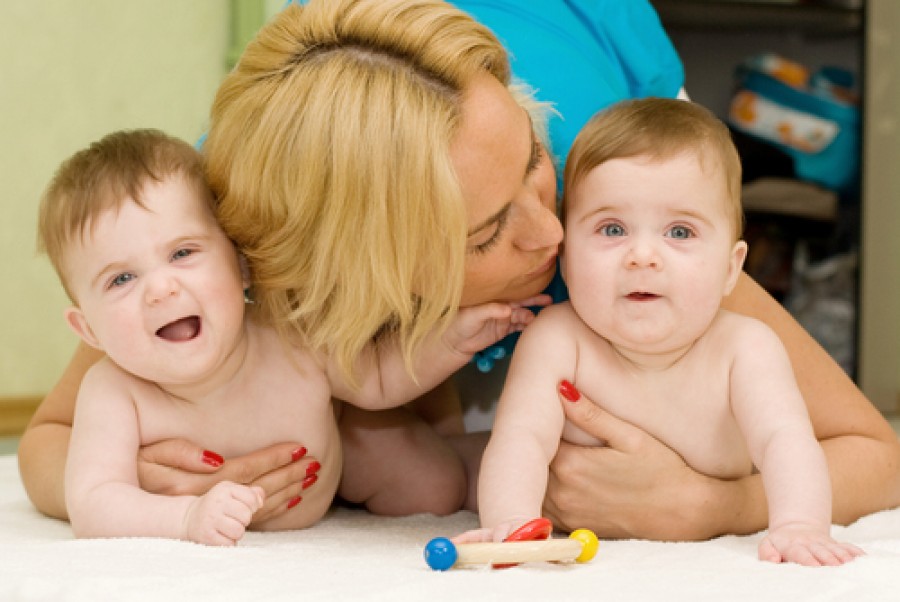How can you increase your chances of having twins?

Some couples wish to have twins more than others.
Although a natural process, there might be a few personal characteristics and techniques that improve your chances of having a twin pregnancy.
While there is a bit of fairytale cuteness about having two little matchingly dressed babies, we must admit that twins are a lot of hard work. They can have an incredible bond between them which is lovely while they are growing up and even into adulthood.
But for the younger days, especially the first year, the workload for the parents is incredible and can feel at times never-ending.
If you are trying for twins there might be some things you can do which increases your chances, but most of this is down to genetics and the magic of babymaking.
How are twins made?
This is not the birds and the bees talk – essentially babies are all made the same way, but inside the woman, things get a little bit different when making twins.
There are two types of twins, fraternal and identical twins. Fraternal or dizygotic twins are formed by the fusion of two separate eggs with two separate sperms.
They are no more genetically similar than any other siblings born from the same parents.
Identical or monozygotic twins are formed by the fusion of one egg and one sperm which splits into two equal halves with a single placental supply.
Two babies grow which share exactly the same genetic information.
While the incidence of twins being born is on the increase in recent years, this is not because of some special potion or a secret ingredient that women are taking.
It is basically on the increase because mothers are getting older before having their first child, and more women are using fertility assistance to conceive, both of which up your chances of having twins.
What are the chances of having twins?
Twins are found to be conceived by only 3% of pregnant women, resulting in slim chances of having twins or triplets. In Australia, 1 out of 90 pregnancies results in twins or a multiple pregnancy.
Fraternal twins are even harder to conceive and are more complicated, they mostly occur to women who carry the specific twin genes in her family background.
What characteristics can boost the chances of twins?
Generally, twins are more commonly conceived by a specific category of the population with physical or genetic characteristics. The characteristics that make conceiving twins or triplets in women are detailed below.
#1 Over 35 years old
Women who are over 35 may undergo a variation in their menstrual cycle length and may release more than one egg per cycle, which increases older mums’ chances of twins.
This is because older women have higher levels of oestrogen, which stimulates the ovaries.
The increase is minimal, with the odds of having twins for women aged between 25 and 29 at 3%, at 4% for women aged 30-34 and up for 5% for women aged between 35-39.
Even if you desperately want to have twins, we don’t recommend waiting until you are over 35 to increase your chances of doing so.
Every year that you wait past age 35 actually reduces your chances of getting pregnant at all, so waiting until you are older is definitely not an advisable strategy.
Read more on facts on pregnancy at age 35 and over here.
#2 Taller women
There is no exact cause known, but women with good height have a higher incidence of having twins when compared to women with short height.
#3 Maternal family history
Twins genes running in the mother’s family can make a huge impact in having twins. The father’s genes reportedly play a lesser part in this process.
A woman who has twin aunts or twin uncles has more chances of having twins herself.
#4 You are a twin sister yourself
Similarly, if a woman is a twin sibling herself, she has a higher chance of having twins.
She would be passing on genes to her babies.
What can we do to increase chances of twins if not carrying twin genes?
Women who do not have any of the above characteristics can still take some steps to try to conceive twins or triplets.
There is some proven and unproven research regarding a few special plants, animal products, and medications which assist in conceiving twins and have resulted in some successful attempts.
There is scientific evidence to support that all of the factors detailed below may play some part in increasing your chances of conceiving twins, however, this increase is only very small.
You could take all of the steps we list and still come up with one baby at a time.
Listed below are some factors which help women to conceive twins who don’t have any family history.
#1 Folic acid
Women who increase their intake of folic acid have more chances of conceiving twins.
Folic acid aids in the process of ovulation and may cause the release of more than one egg.
Folic acid is normally prescribed to all pregnant women during their first trimester of pregnancy to prevent neural tube defects in the newborn.
Besides the prevention of brain and spine deformation in the foetus, folic acid may be given to women who wish to try for twins.
Folic acid may be taken in tablet form and one tablet a day or as per your doctor’s advice.
#2 Zinc for the dads
Zinc supplements may help in conceiving twins if taken by men.
Zinc increases sperm motility and can build stronger sperm, resulting in more chances for multiple sperm to penetrate into more than one egg.
Zinc supplements may be taken if tolerated, but zinc-rich sources can also help.
Some examples of zinc-rich sources include oysters, crabs, cashews, chickpeas, green leafy vegetables etc.
#3 Sweet potatoes
Sweet potatoes are a good source of vitamins especially B6 and C, which are good stimuli for ovulation.
Including extra sweet potatoes in your diet can increase your chance of conceiving twins by stimulating ovulation.
#4 Eat and drink sources of phytoestrogen
Another root vegetable called the cassata, also known as the yucca, may also increase your chances.
Women from Nigeria who have some of the highest rates of twin births in the world eat lots of cassata.
The peelings from this plant are high in phytoestrogen which can help you to release multiple eggs. Some experts believe this is the superfood of multiple birthing mums.
Other sources of phytoestrogen include beans, lentils, rice, bran, soy products, berries, apples, carrots, pomegranates, seeds, oats, and barley.
#5 Breastfeeding
Women who breastfeed a child while trying to conceive for another baby are found to have a higher chance of resulting in a twin pregnancy.
During breastfeeding, the hormones required for ovulation are higher in quantity.
Therefore if you are breastfeeding your baby and trying for another you may end up having twins.
Then you might have 3 within 18 months which is a handful, so be prepared if you decide to try this method of increasing your chances!
#6 Fertility drugs
It is very common these days for women over 35 years of age to try fertility drugs such as clomiphene citrate (Clomid).
Fertility drugs give 75% chances of conceiving twins.
They work by upping the hyperstimulation of ovulation and can result in the release of more than one egg.
#7 In-vitro fertilisation (IVF)
IVF more often results in multiple pregnancies than the incidence that happens through natural conception. This involves procedures which stimulate ovulation with folic acid, clomiphene citrate andother pregnancy hormones.
IVF also very often involves the implantation of more than one embryo at a time, because of the high risk of losing any of them.
Through this, many women end up having multiple embryos survive and carry twins, multiples and even more babies to term.
#8 Magnesium & Calcium
Magnesium and calcium are somehow found beneficial in conceiving twins however the evidence supporting this is limited.
Increasing your intake of dairy may help as there is some evidence that the proteins in dairy can up your likelihood of releasing multiple eggs.
#9 Try straight after going off the birth control pill
If you have been taking the birth control pill for some years which regulates your cycle, you might have more of a chance of conceiving twins in the first few months after coming off the pill.
As your body adjusts to its normal hormone production levels it has a higher chance of releasing multiple eggs.
#10 Gain weight
It has been reported that women within a healthy weight range have a higher chance of conceiving twins than women who are underweight.
Apparently also women who have BMI of 30 or over have more tendencies to conceive twins.
We do not, however, recommend increasing your weight to dangerous levels to try for twins, as again you are more likely to affect your ability to conceive at all than result in a multiple pregnancy.
#11 Having more kids
If she has already had more than 2 children, the women’s body becomes used to increased ovulation and may cause a release of more than one egg.
Women who have a big family have more chances of having twins.
Some modern myths – things that won’t increase your chances of having twins
#12 Sexual position
While there is some limited evidence that sexual position may affect whether you conceive a boy or girl (and this evidence is very limited), there is no information that any particular sexual position will increase your chances of having twins.
#13 Aerobics
Standing on your head or lying on your back with your feet in the air does not help your chances of conceiving twins.
#14 Morning sickness
Some people say that if you have very bad morning sickness then it is a sign that you are carrying twins. This is a myth, there is no evidence to support this theory.
If you don’t have the necessary genetics then there might only be little things that you can do to help things along.
Stay healthy first and good luck!



